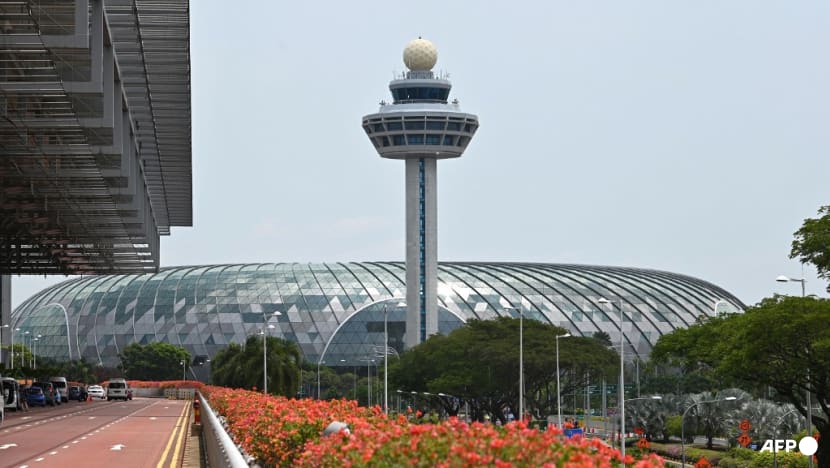Essential air, sea and land transport operators could be subject to more controls under new draft law
The proposed law seeks to strengthen the resilience of "key firms" in the air, sea and land transport sectors in Singapore, and safeguard their provision of essential transport services, said the Ministry of Transport.

The control tower of Changi Airport in Singapore. (File photo: AFP/Roslan Rahman)
SINGAPORE: Key air, sea and land transport operators could be subject to more controls over ownership, operations and management appointments, if they become designated entities under a new proposed law that could come into force in the second half of 2024.
Under draft amendments tabled in parliament on Wednesday (Apr 3), entities may be designated by the relevant authority – Civil Aviation Authority of Singapore (CAAS), Maritime and Port Authority (MPA) or Land Transport Authority (LTA) – if they are “key entities involved in the provision of essential transport services” in Singapore.
They can be designated as a “designated operating entity” if they directly provide essential transport services in Singapore or a “designated equity interest holder” if they hold equity interest in the former.
The Bill seeks to strengthen the resilience of "key firms" in the air, sea and land transport sectors in Singapore, and safeguard their provision of essential transport services, said the Ministry of Transport (MOT) in a press release on Wednesday.
“The COVID-19 pandemic has reinforced the importance of our air and sea hubs, while mass public transport remains essential to ensuring safe and reliable commutes in Singapore,” said MOT's spokesperson.
This review of sector-specific controls for the transport sectors complements the Significant Investments Review Act passed in January, said the spokesperson.
The Significant Investments Review Act scrutinises significant investments, whether local or foreign, into entities that are critical to Singapore’s national security interests. It introduced a new investment management regime for specified entities identified as critical to national security.
Entities designated under MOT’s sectoral legislation will not be designated under the Significant Investments Review Act at the same time, said MOT in a press release on Wednesday.
Under the proposed amendments, designated entities will face three types of controls, said MOT's spokesperson.
Ownership controls will ensure oversight of changes in their effective control “to safeguard against adverse influence”.
For example, buyers and sellers may need to notify or seek approval from the authorities depending on the amount, and the designated entities must notify the authorities within seven days of becoming aware of these changes in ownership and control.
Suggested controls over management appointments will ensure that the people who are “principally responsible” for the management of the designated entities are fit and proper, and not “inimical to national interests”, the spokesperson added.
Under the proposed legislation, designated entities will have to obtain approval from the relevant authority when appointing their CEO and the chairperson of their board. This extends to directors of the boards if the designated entity is also a licensed operator, said the spokesperson.
Current laws already require licensed public transport operators to seek LTA’s approval for the appointment of their CEOs and boards.
If the Bill is passed, designated entities will need to notify the relevant authority of events that could “materially impede or impair” the provision of essential transport services in Singapore, said the MOT spokesperson.
These operations or resourcing controls will ensure that designated entities have enough resources and capabilities to provide essential transport services, they added.
If the Bill is passed, the Transport Minister, upon application by the relevant authority, can issue a special administration order to ensure the service continues, in the “extreme scenario” where the designated operating entity cannot provide essential transport services safely and reliably.
Under the proposed laws, if designated entities breach these controls, including conditions for approval, they could be subject to remedial directions, including the disposal of equity interest and the removal of key appointment holders, said the MOT spokesperson.
Breaching the controls and any of the remedial directions will also be considered an offence, and the penalties for these offences will take reference from existing penalties under the relevant Acts.
A person may appeal to the Transport Minister within 14 days of being informed of the relevant authority’s decision on designation, and applications for approval for ownership or management appointments.

















